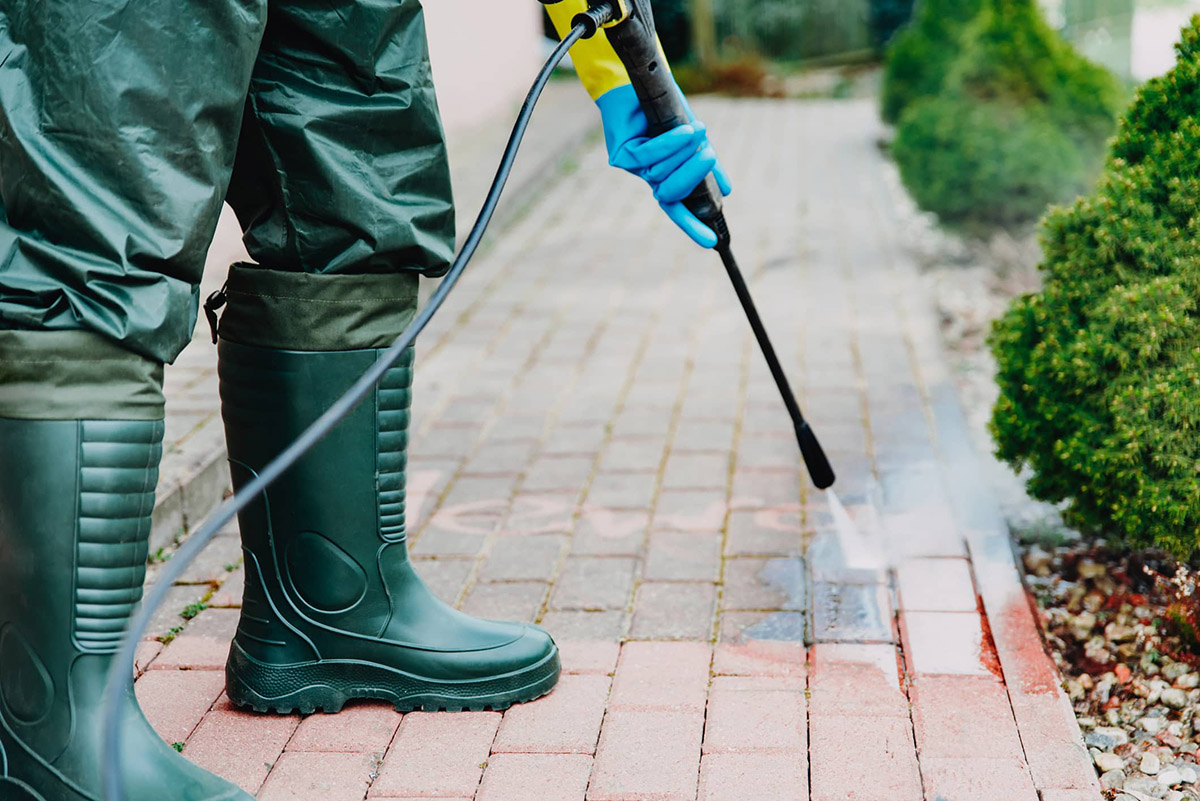Home>Finance>How Much Is Insurance For A Lawn Care Business?


Finance
How Much Is Insurance For A Lawn Care Business?
Published: November 12, 2023
Looking for insurance for your lawn care business? Find out how much it will cost with our helpful finance guide!
(Many of the links in this article redirect to a specific reviewed product. Your purchase of these products through affiliate links helps to generate commission for LiveWell, at no extra cost. Learn more)
Table of Contents
- Introduction
- Factors Affecting Insurance Costs
- Liability Insurance
- Property Insurance
- Workers’ Compensation Insurance
- Vehicle Insurance
- Bonding Insurance
- Umbrella Insurance
- Additional Insurances for Lawn Care Businesses
- How to Obtain Insurance for Your Lawn Care Business
- Tips for Saving on Insurance Costs
- Conclusion
Introduction
Running a successful lawn care business requires careful planning and consideration of various factors, including insurance coverage. While insurance may not be the most exciting aspect of entrepreneurship, it is an essential component that can safeguard your business from potential risks and liabilities.
Insurance for a lawn care business provides financial protection in the event of accidents, property damage, or lawsuits. It offers peace of mind knowing that you are equipped to handle unforeseen circumstances that could otherwise jeopardize the viability of your business.
However, determining how much insurance coverage you need and how much it will cost can be a complex task. Insurance costs for a lawn care business depend on various factors, including the size of your business, the services you offer, the location, and the number of employees. In this article, we will explore the factors that affect insurance costs for a lawn care business and discuss the different types of insurance you should consider.
Understanding the various insurance options and their associated costs will help you make informed decisions about the coverage that best suits your business needs. It will also enable you to budget effectively and ensure that your business is adequately protected.
Factors Affecting Insurance Costs
Several factors influence the cost of insurance for a lawn care business. Understanding these factors is essential as it allows you to assess your risk profile and determine the appropriate coverage for your business. Here are the key factors that impact insurance costs:
- Business Size and Scope: The size and scope of your lawn care business play a significant role in determining insurance costs. Larger businesses with more employees and greater revenue streams generally require higher coverage limits and therefore, higher premiums.
- Services Offered: The specific services your lawn care business provides can also affect insurance costs. Some services, such as tree removal or pesticide application, carry more risk and may result in higher premiums due to the increased likelihood of accidents or environmental damage.
- Location: The geographic location of your business can impact insurance costs. Areas with higher crime rates or extreme weather conditions may lead to increased risks, thereby influencing policy prices.
- Claims History: Your business’s claims history plays an essential role in insurance costs. If your business has a history of frequent claims, insurance companies may consider it a higher risk and charge higher premiums to offset potential payouts.
- Employee Training and Safety Practices: Insurance companies value businesses that prioritize employee training and safety practices. Having documented safety protocols and training programs in place can potentially reduce insurance costs by demonstrating a commitment to risk management.
- Deductibles and Coverage Limits: The deductibles and coverage limits you choose will impact your premiums directly. A higher deductible may lower your premium but leaves you responsible for a greater portion of the cost in the event of a claim.
It’s important to work closely with an insurance provider who specializes in small businesses or the lawn care industry. They can assess your specific needs and provide tailored coverage options that align with your risk profile and budget.
Liability Insurance
Liability insurance is a crucial component of insurance coverage for a lawn care business. It protects your business from potential lawsuits or claims arising from bodily injury or property damage caused by your services or operations. Here are some key points to consider about liability insurance:
Types of Liability Insurance: There are different types of liability insurance to consider for your lawn care business:
- General Liability Insurance: This coverage protects against claims related to bodily injury, property damage, personal injury, or advertising injury. It can cover medical expenses, legal fees, and settlements or judgments resulting from these claims.
- Professional Liability Insurance: Also known as Errors and Omissions (E&O) insurance, this coverage protects your business against claims for professional negligence, errors, or omissions. It can be especially relevant if you offer specialized services like landscape design or horticultural consulting.
Importance and Benefits: Liability insurance is vital for your lawn care business because it provides the following benefits:
- Protection against Lawsuits: Accidents happen, and if someone is injured or property is damaged due to your business activities, you could be sued. Liability insurance helps protect your business assets and cover legal expenses.
- Peace of Mind: Having liability insurance in place gives you peace of mind, knowing that you are financially protected and can handle any potential claims or lawsuits that may arise.
- Credibility and Professionalism: Clients, especially commercial or larger entities, often require proof of liability insurance coverage before hiring a lawn care service. Having liability insurance can increase your business’s credibility and open doors to new opportunities.
Factors Affecting Costs: The cost of liability insurance for your lawn care business will depend on factors such as the size of your business, revenue, location, claims history, and coverage limits. Insurance providers will assess your risk profile to determine the appropriate premium.
Consult with an insurance professional who specializes in small businesses or the lawn care industry to ensure you have the appropriate liability coverage for your specific needs. They can help you select the right policies, coverage limits, and deductibles that fit your budget while providing adequate protection.
Property Insurance
Property insurance is an essential component of insurance coverage for a lawn care business. It protects your business assets, including equipment, tools, vehicles, and physical structures, from various risks such as theft, fire, vandalism, and natural disasters. Here are some key points to consider about property insurance:
Types of Property Insurance: There are different types of property insurance policies you may need for your lawn care business:
- Commercial Property Insurance: This coverage protects the physical structure of your business premises, including buildings, fences, and other structures, against damage or loss caused by covered perils.
- Business Personal Property Insurance: This coverage protects the contents of your business, such as equipment, tools, supplies, and inventory, from damage, loss, or theft.
Importance and Benefits: Property insurance is vital for your lawn care business because it provides the following benefits:
- Asset Protection: Your business assets, such as equipment, vehicles, and structures, are valuable investments. Property insurance helps replace or repair these assets in the event of damage, loss, or theft, minimizing financial setbacks for your business.
- Continuity of Operations: If your equipment or tools are damaged or stolen, it can disrupt your business operations. Property insurance ensures that you can quickly replace or repair these items, allowing you to continue serving your clients without significant interruption.
- Liability Coverage: Some property insurance policies may include liability coverage. For example, if a client trips and falls on your premises, causing injury, property insurance may help cover medical expenses or legal fees if a lawsuit arises.
Factors Affecting Costs: The cost of property insurance for your lawn care business depends on several factors, including the value of your assets, location, security measures in place, and coverage limits. Insurance providers will assess the risk associated with your specific situation to determine the appropriate premium.
Be sure to document and maintain an inventory of your business assets, including serial numbers, purchase receipts, and photographs, to assist in the claims process. It is also advisable to review your property insurance coverage periodically to ensure it adequately reflects any changes in your assets or business operations.
Consult with an insurance professional who specializes in small businesses or the lawn care industry to assess your property insurance needs accurately. They can help you determine the appropriate coverage and deductible levels to protect your assets while staying within your budget.
Workers’ Compensation Insurance
Workers’ compensation insurance is a crucial component of insurance coverage for a lawn care business that has employees. It provides financial protection for both the business owner and employees in the event of work-related injuries or illnesses. Here are some key points to consider about workers’ compensation insurance:
What is Workers’ Compensation Insurance?
Workers’ compensation insurance is a type of coverage designed to provide medical benefits, wage replacement, and rehabilitation services to employees who are injured or become ill due to work-related activities. It also protects employers from potential lawsuits related to workplace injuries.
Why is it Important?
Workers’ compensation insurance is essential for your lawn care business for the following reasons:
- Legal Compliance: In most jurisdictions, having workers’ compensation insurance is required by law if you have employees. Failing to have this coverage can result in significant legal and financial consequences.
- Medical Expenses and Lost Wages: If one of your employees gets injured or falls ill while performing their job duties, workers’ compensation insurance covers their medical expenses, including doctor visits, hospitalization, medication, and rehabilitation. It also provides wage replacement benefits for the time they are unable to work due to their injuries or illnesses.
- Protection for Employers: Workers’ compensation insurance protects employers by providing coverage for on-the-job injuries. It helps mitigate potential lawsuits and legal claims from employees seeking compensation for workplace injuries.
Factors Affecting Costs:
Several factors can influence the cost of workers’ compensation insurance for your lawn care business. These include:
- Number of Employees: The more employees you have, the higher the cost of workers’ compensation insurance.
- Industry Risk: Lawn care businesses may be considered higher risk due to potential hazards associated with operating equipment, handling chemicals, and working outdoors. This can impact the cost of insurance.
- Claims History: Your business’s claims history will be taken into account when determining the cost of workers’ compensation insurance. If you have a history of frequent claims, it may result in higher premiums.
Working with an insurance professional who specializes in workers’ compensation insurance can help you navigate the complexities of this coverage. They can assist in assessing your specific needs and ensuring that you have the appropriate coverage to protect both your employees and your business.
Vehicle Insurance
Vehicle insurance is a critical component of insurance coverage for a lawn care business that relies on vehicles for daily operations. It provides protection for your business vehicles, drivers, and third-party liabilities. Here are some key points to consider about vehicle insurance:
Types of Vehicle Insurance:
There are different types of vehicle insurance policies that you may need for your lawn care business:
- Commercial Auto Insurance: This coverage is specifically designed for businesses and covers vehicles used for business purposes. It provides protection against accidents, theft, vandalism, and other damage to the vehicle.
- Hired and Non-Owned Auto Insurance: If your business uses vehicles that are not owned by the company, such as rental vehicles or vehicles owned by employees, this coverage protects against liability claims arising from accidents involving those vehicles.
Importance and Benefits:
Vehicle insurance is vital for your lawn care business because it provides the following benefits:
- Asset Protection: Your business vehicles are valuable assets that are essential for your operations. Vehicle insurance helps cover the cost of repairs or replacement if they are damaged or stolen.
- Liability Coverage: Accidents happen, and if one of your drivers is involved in an accident that causes property damage or injuries to others, vehicle insurance provides liability coverage to protect your business from potential lawsuits and financial liabilities.
- Peace of Mind: Having vehicle insurance in place gives you peace of mind, knowing that you have the necessary coverage to handle any unforeseen circumstances or accidents on the road.
Factors Affecting Costs:
Several factors can influence the cost of vehicle insurance for your lawn care business. These include:
- Type and Number of Vehicles: The type and quantity of vehicles you have in your fleet will impact the cost. Insuring larger or more expensive vehicles typically results in higher premiums.
- Driving Records: The driving records of your employees can affect insurance costs. Insurance providers may consider the number of accidents or traffic violations on record when determining premiums.
- Usage of Vehicles: The purpose for which you use your vehicles, such as transporting equipment or chemicals, can impact insurance costs due to the associated risks.
Consult with an insurance professional who specializes in commercial vehicle insurance to ensure you have the appropriate coverage for your specific needs. They can help you choose the right policies, coverage limits, and deductibles to protect your business vehicles while staying within your budget.
Bonding Insurance
Bonding insurance is an important type of insurance coverage for a lawn care business, especially if you frequently work on projects that require bonding. It provides financial protection against losses arising from failed contractual obligations or non-performance of services. Here are some key points to consider about bonding insurance:
What is Bonding Insurance?
Bonding insurance, also known as surety bonds, is a contract between three parties: the principal (your lawn care business), the obligee (the party requiring the bond, such as a client or government entity), and the surety company (the insurer). It guarantees that your business will fulfill its contractual obligations to the obligee.
Types of Bonding Insurance:
There are different types of bonding insurance policies that you may need for your lawn care business:
- License and Permit Bonds: These bonds are often required by government agencies as proof that your business has the necessary licenses and permits to operate legally in a specific jurisdiction.
- Contract Bonds: Contract bonds provide assurance to clients that you will perform the work as specified in the contract. Examples include bid bonds, performance bonds, and payment bonds.
- Business Service Bonds: These bonds protect against theft or dishonest acts committed by your employees while on a client’s property.
Importance and Benefits:
Bonding insurance is essential for your lawn care business because it provides the following benefits:
- Gaining Client Trust: Having bonding insurance demonstrates your business’s financial stability and reliability, giving clients peace of mind when choosing to work with you.
- Contract Requirements: Many construction projects or government contracts require bonding insurance as a prerequisite for participation. By having this coverage, you can access a broader range of projects and clients.
- Financial Protection: Bonding insurance protects your business from financial losses in the event of non-performance or failure to fulfill contractual obligations. The surety company may provide compensation to the obligee, but your business will be responsible for reimbursing the surety.
Factors Affecting Costs:
The cost of bonding insurance for your lawn care business is influenced by several factors, including:
- Bond Amount: The larger the bond amount, the higher the premium. Bond amounts are typically a percentage of the total project value or a set dollar amount.
- Business Financials: The financial stability and creditworthiness of your business can impact bonding insurance costs. Surety companies assess financial statements, credit scores, and business performance to determine risk.
- Prior Bond Claims: If your business has had previous bond claims or a history of non-performance, it may result in higher premiums or difficulty obtaining bonding insurance.
Consult with an insurance professional who specializes in bonding insurance to assess your specific needs accurately. They can guide you through the bonding process and help you obtain the necessary bonds to meet contractual requirements for your lawn care business.
Umbrella Insurance
Umbrella insurance is an additional layer of liability coverage that goes beyond the limits of your primary insurance policies. It provides an extra level of financial protection for your lawn care business in the event of a catastrophic or high-value lawsuit. Here are some key points to consider about umbrella insurance:
What is Umbrella Insurance?
Umbrella insurance is a type of liability insurance that provides coverage beyond the limits of your general liability, commercial auto, or employer’s liability policies. It acts as a “safety net” by extending your coverage and protecting your business from substantial financial losses arising from a lawsuit or significant liability claim.
Importance and Benefits:
Umbrella insurance is essential for your lawn care business because it provides the following benefits:
- Increased Liability Protection: Umbrella insurance provides additional coverage beyond the limits of your primary insurance policies. This added layer of protection can be invaluable in the event of a lawsuit or liability claim that exceeds your primary policy limits.
- Protection Against High-Value Claims: In the event of a catastrophic accident or substantial liability claim, the costs can quickly escalate. Umbrella insurance helps cover these high-value claims, potentially saving your business from bankruptcy or financial ruin.
- Broader Coverage: Umbrella insurance may extend coverage to certain risks that are not covered by your primary policies, providing a more comprehensive level of protection for your business.
Factors Affecting Costs:
The cost of umbrella insurance for your lawn care business is influenced by several factors, including:
- Level of Coverage: The amount of coverage you choose will affect the cost of umbrella insurance. Higher coverage limits will generally result in higher premiums.
- Industry and Risk Profile: The nature of your lawn care business and associated risks can impact the cost of umbrella insurance. Factors such as the number of employees, services offered, and claims history may be considered by insurance providers when determining premiums.
- Underlying Insurance Policies: The type and limits of your underlying primary insurance policies can affect the cost of umbrella insurance. Higher limits on your primary policies may result in more affordable umbrella insurance premiums.
Consult with an insurance professional who specializes in commercial umbrella insurance to assess your specific needs accurately. They can guide you through the process of obtaining the appropriate coverage for your lawn care business and help you understand the cost implications.
Additional Insurances for Lawn Care Businesses
In addition to liability, property, workers’ compensation, vehicle, bonding, and umbrella insurance, there may be other types of insurance that are important for your lawn care business. While these additional coverages may not be necessary for every business, they can provide added protection and address specific risks. Here are some insurance options to consider:
- Equipment Insurance: This type of insurance covers the repair, replacement, or loss of your lawn care equipment, such as mowers, trimmers, and blowers. It safeguards your investment and ensures that you can continue your operations without significant interruptions.
- Inland Marine Insurance: Inland marine insurance protects your equipment while it is in transit or being stored off-site. This coverage is especially important if you frequently transport your equipment to different job sites or store it in locations other than your primary business premises.
- Cyber Liability Insurance: As technology becomes increasingly integrated into businesses, protecting your online presence and sensitive customer data is crucial. Cyber liability insurance helps cover the costs associated with data breaches, cyberattacks, and other cyber-related incidents.
- Environmental Liability Insurance: If your lawn care business involves the application of pesticides or chemicals, environmental liability insurance can protect you in the event of accidental pollution or environmental damage caused by your operations. This coverage can help cover the costs of cleanup, remediation, and legal expenses.
- Business Interruption Insurance: Business interruption insurance provides coverage for lost income and ongoing expenses in the event that your lawn care business is temporarily unable to operate due to a covered event, such as a natural disaster. It can help mitigate the financial impact of unexpected closures or disruptions.
It’s important to assess the specific risks and needs of your lawn care business before deciding on additional insurance coverages. Consult with an insurance professional who specializes in small businesses or the lawn care industry to help determine which additional insurances may be beneficial to protect your specific operations and minimize potential financial risks.
How to Obtain Insurance for Your Lawn Care Business
Obtaining insurance for your lawn care business is a crucial step in protecting your assets, employees, and financial well-being. Here are some steps to help you navigate the process of obtaining insurance:
- Assess Your Insurance Needs: Evaluate the specific risks associated with your lawn care business and determine the types of insurance coverage you require. Consider factors such as the size of your business, the services you offer, the number of employees, and the value of your assets.
- Research Insurance Providers: Look for insurance companies or brokers who specialize in small businesses or the lawn care industry. They will have expertise in understanding the unique needs and risks of your business, ensuring you receive appropriate coverage.
- Get Multiple Quotes: Request quotes from several insurance providers to compare coverage options and costs. This allows you to make an informed decision and find the best coverage at competitive rates.
- Review Policy Coverage and Exclusions: Carefully review the coverage details of each insurance policy. Understand what is covered, any exclusions or limitations, deductibles, and coverage limits. Ensure the policies align with your specific business needs.
- Consider Bundling Policies: Some insurance providers offer package deals or discounts when you bundle multiple policies together, such as liability, property, and vehicle insurance. Bundling can provide cost savings and simplify your insurance management.
- Understand Policy Terms and Conditions: Review and understand the terms and conditions of the insurance policies you are considering. Pay attention to details such as the claims process, policy renewal terms, and any additional requirements the insurer may have.
- Work with an Insurance Professional: Consider working with an insurance professional or broker who specializes in small businesses or the lawn care industry. They can guide you through the insurance process, provide expert advice, and help you secure appropriate coverage.
- Maintain Accurate Business Records: Keep detailed records of your business activities, including contracts, financial statements, employee records, and safety training documentation. Accurate records can help streamline the insurance application process and potentially lower insurance costs.
- Regularly Review and Update Your Coverage: As your lawn care business evolves and grows, regularly review your insurance coverage to ensure it adequately protects your changing needs. Update your policies as necessary to reflect any changes in your operations, assets, or risks.
Remember, insurance is a critical investment in the long-term success and stability of your lawn care business. By taking the time to assess your needs, research options, and work with professionals, you can secure the right insurance coverage that provides peace of mind and financial protection.
Tips for Saving on Insurance Costs
While insurance is essential for protecting your lawn care business, it’s also important to find ways to save on insurance costs. Here are some tips to help you reduce your insurance premiums without compromising on coverage:
- Shop Around: Obtain quotes from multiple insurance providers to compare coverage options and pricing. Different insurers may offer different rates, so don’t settle for the first quote you receive.
- Bundle Policies: Consider bundling multiple insurance policies, such as liability, property, and vehicle insurance, with the same insurance provider. Many insurers offer discounts when you consolidate your policies with them.
- Assess Deductibles and Coverage Limits: Adjusting deductibles and coverage limits can impact your premiums. Consider increasing deductibles, which will lower your premiums, but ensure you can comfortably afford the out-of-pocket expenses if a claim occurs.
- Implement Risk Management Practices: Demonstrate to insurers that you take risk mitigation seriously by implementing safety protocols, providing employee training, and maintaining a clean claims history. Insurers may offer lower rates to businesses with strong risk management practices.
- Review Your Policies Regularly: Regularly review your insurance policies to ensure they accurately reflect your business’s needs. As your business changes and grows, update your coverage accordingly to avoid paying for unnecessary or insufficient coverage.
- Consider Higher Deductibles for Low-Frequency Claims: For coverages with low likelihood of filing a claim, such as property insurance, consider opting for higher deductibles. This can lower your premiums while still providing protection against major losses.
- Invest in Safety Measures: Installing security systems, fire alarms, video surveillance, and other safety measures can reduce insurance premiums. Insurers often offer discounts to businesses that take steps to minimize risks.
- Review Your Business Classification: Ensure your lawn care business is classified accurately by your insurance provider. Some classifications may have higher premiums, so it’s crucial to ensure you are placed in the appropriate category.
- Take Advantage of Professional Associations: Check if there are any professional associations or trade organizations in the lawn care industry that offer group insurance policies at discounted rates. Being a member of such associations can provide access to cost-effective insurance options.
- Consider Higher-Value Policies: In some cases, purchasing higher-value policies with higher coverage limits may be more cost-effective than having multiple lower-value policies. Consult with an insurance professional to find the optimal balance for your business.
Remember to strike a balance between cost savings and adequate coverage for your lawn care business. While saving on insurance costs is important, it’s crucial to ensure you have appropriate coverage to protect your business from potential risks and liabilities.
Conclusion
Insurance is a critical aspect of running a successful lawn care business. It provides financial protection, peace of mind, and the ability to navigate unexpected risks. By understanding the various types of insurance available and considering the specific needs of your business, you can make informed decisions about the coverage necessary to safeguard your assets, employees, and reputation.
Factors such as the size of your business, the services you offer, location, and claims history all influence the cost of insurance. However, by implementing risk management practices, shopping around for competitive quotes, and reviewing your coverage regularly, you can find ways to save on insurance costs without sacrificing the level of protection your business requires.
Remember to work with insurance professionals who specialize in small businesses or the lawn care industry. They have the expertise and knowledge to assist you in assessing your unique risks and tailor insurance packages to suit your specific needs and budget.
Obtaining comprehensive insurance coverage for your lawn care business is not just an expense but an investment in the long-term success and stability of your operations. It is an essential tool that allows you to focus on providing top-quality service to your clients without worrying about potential financial setbacks caused by accidents, lawsuits, or other unforeseen events.
Take the time to evaluate your insurance needs, explore different types of coverage, and work with reputable insurance providers to obtain the right policies for your lawn care business. With the appropriate insurance coverage in place, you can operate your business with confidence, knowing that you have taken the necessary steps to protect yourself, your employees, and your assets.














